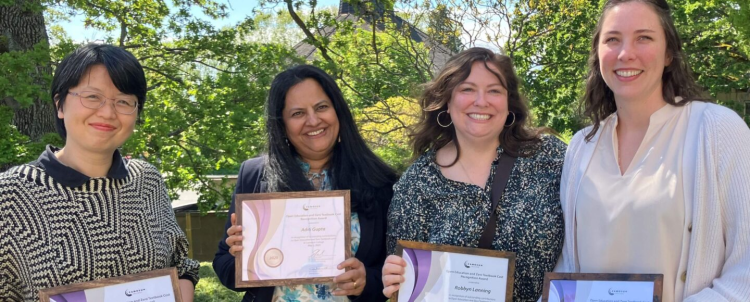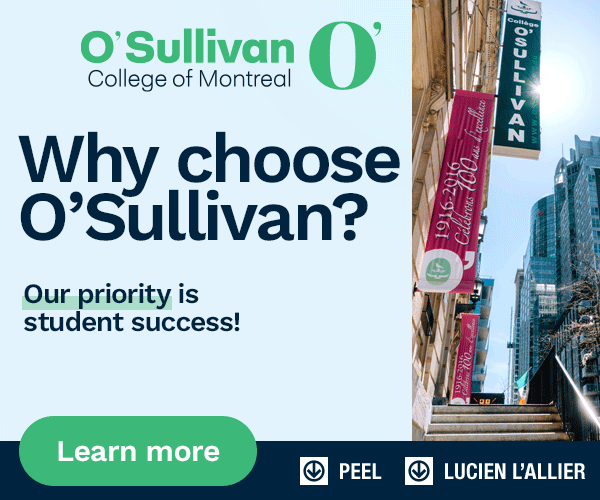A new toolkit is now available to UVic faculty and staff, the result of over three years of research by librarians with lived experience on how international students experience Canadian education.

UVic librarians Ying Liu and Aditi Gupta with Camosun College colleagues Robbyn Lanning and Sk'ing Lúudas Natasha Parrish at Camosun College receiving an Open Education and Zero Textbook Cost Recognition Award, May 2025. Credit: Greg Lanning
Designed to offer strategies, frameworks, checklists and scenarios to promote inclusive practices, the Culturally Responsive and Inclusive Teaching Toolkit aims to address the lack of practical strategies in the literature, providing quick, actionable steps for busy instructors.
Divided into four sections culturally responsive teaching, inclusive teaching, decolonizing teaching and universal design for learning along with six scenarios and detailed checklists to address specific classroom needs, the toolkit employs a robust approach. Last year, University of Victoria Engineering and Science Librarian Aditi Gupta presented the toolkit at the Association of Research Libraries (ARL) 2024 Inclusion, Diversity, Equity, and Accessibility in Libraries & Archives (IDEAL) Conference where the scenarios were tested to positive reviews.
Lived experience drives positive change in the classroom
In 2021, Gupta and Humanities Librarian Ying Liu had a collective epiphany when they identified a lack of cultural inclusivity in their library instruction. As a consequence of their collegiality and joint goals, they collaborated on a toolkit for library instructors, reference providers and faculty instructors to guide them in making learners more comfortable, and to give students a highly valued sense of belonging in the academic setting.
As an immigrant from India, my journey to Canada as an international student led me to pursue a degree in librarianship, a path that shaped my commitment to fostering equity, celebrating diversity and creating inclusive spaces where all voices, especially students feel a true sense of belonging. This toolkit is a reflection of the collaborative work that my colleagues and I have done to challenge inequities in access to information, foster a culture of understanding, reciprocity and respect."
Aditi Gupta, UVic Engineering and Science librarian
Shanghai-born Liu, who immigrated to Canada in 2001, found adjusting to Canadian university life was no easy undertaking while striving for academic success--a common experience on Canadian multicultural campuses. "In my career as an academic librarian providing reference support for 19 years, I have helped many students, including those students from equity-seeking groups, who struggle with similar challenges," says Liu.
It is with this shared experience that the two librarians embarked on a multi-year project that involved mixed-method qualitative study, literature review and focus groups to establish their new framework for inclusivity.
Inclusivity in a post-pandemic world
After receiving the UVic Learning and Teaching Innovation's Anti-Racism Initiative Grant (2021-2023), Gupta and Liu set out to identify barriers, attitudes, strategies, existing practices and highlight gaps in cultural competency and fluency guidelines and best practices. They also examined efforts by librarians, faculty and library staff to promote culturally responsive and inclusive teaching practices at UVic.
At the beginning of their research, Gupta and Liu's literature review showed a lack of studies on practical strategies that individuals could apply in their classrooms. Consequently, they wanted to develop a realistic guide to help instructors, who are busy with teaching and research, to effectively work with international students who may face alienation, isolation and invisibility in the classroom.
The toolkit then emerged from personal experiences and focus group research, emphasizing culturally responsive and inclusive pedagogy, trauma-informed care, decolonizing instruction and curriculum, and universal design for learning approaches.
In March 2024, Gupta, Liu and colleagues published a research article that summarized their findings from focus group interviews. They discovered "that while faculty and librarians are making individual efforts to promote inclusivity in teaching and interacting with library patrons, many participants expressed the necessity for institutional-level training, guidelines and good practices on how to achieve and implement culturally responsive and inclusive teaching strategies."
"Librarians, faculty and instructors can pick and embed one or two things into their instruction and spend half an hour going through a checklist about inclusive teaching and then use one or two ideas going into the classroom," explains Liu. "I personally believe that inclusive teaching is very beneficial for learners."
From Liu's perspective, instructors can positively guide students to academic success when libraries strive to instill a sense of belonging by making systemic changes such as decolonizing their spaces to make them more inclusive, diversifying collections and providing services with empathy.
In 2024, as they worked on the initial sections of the toolkit and envisioned various scenarios, Gupta and Liu then attended a session at the Vancouver Island Library Staff Conference. This led to a collaboration with Camosun College librarian Robbyn Lanning and Education Developer Indigenization Sk'ing Lúudas Natasha Parrish from the Camosun Centre for Excellence in Teaching and Learning, who co-authored the decolonizing teaching portion of the toolkit.
Collaboration with Camosun
"We were pleased to join in collaboration with Ying and Aditi and strengthen the Indigenization and Decolonization lens of the toolkit," says Lanning. "As members of Learning Services, we have been working together creating a variety of library and research-focused resources for Camosun students and faculty."
It's gratifying to share the work we have been developing for implementation across institutions. We feel anti-racism, Indigenization and decolonization work is something we all need to and can work on with guidance. The information about colonization, decolonization and Indigenization, when paired with the checklist and resources provided in the toolkit, help empower educators to take foundational steps towards equity in their classrooms."
Sk'ing Lúudas Natasha Parrish, education developer Indigenization, Camosun Centre for Excellence in Teaching and Learning
Library instruction and toolkit integration
Aimed at librarians, faculty and staff with a primary goal to promote anti-racism and inclusivity in educational environments, the toolkit is suitable for both experienced educators and those new to inclusive pedagogy, serving as a valuable resource.
Real-world toolkit applications are varied. Liu explains that when UVic faculty and instructors ask library staff to conduct a library research session for their students, they can provide a step-by-step outline for how to successfully execute it in the requested classroom. The same guiding principles apply to subject matter experts like an archaeology professor who wishes to have culturally sensitive narratives applied to their instruction.
Sometimes students do not see themselves in the class make-up and in the curriculum as well. We could easily ask instructors if they have students with specific physical or learning needs, and then we could respond by preparing more diverse search topics. Even slowing down our talking speed is helpful when we visit a classroom that has several international students. If we can adopt one little thing in a classroom, that is success for me."
Ying Liu, UVic Humanities librarian
Recognition and commitment
Since its launch earlier this year, the toolkit has garnered interest locally and globally, and plans include tailoring it for specific faculty and expanding its reach across UVic departments.
Gupta and Liu were recently recognized for their dedication and hard work on the toolkit, along with Lanning and Parrish, at Camosun College's annual Open Education and Zero Textbook Cost Recognition Awards. Feedback from faculty and students is expected to grow as the toolkit is promoted and implemented in the upcoming years.
"I am deeply committed to equity, diversity, inclusion and social justice. I recognize that my position grants me both privilege and responsibility and I remain mindful of the systemic barriers faced by many students, faculty and staff especially those from underrepresented backgrounds, and this awareness shapes my work at the libraries," says Gupta. "As I engage with students and colleagues, I always hope this toolkit helps everyone to listen actively, reflect critically and act intentionally to create an inclusive environment."
UVic Associate Art History and Visual Studies professor Dennine Dudley has been using the decolonizing content in their course development.
"I've always worked towards making my classes welcoming and my courses as student-centred as possible, explains Dudley. "The toolkit has been a welcome addition to my pedagogical development as I continue to hone my strategies; the checklists provide a handy resource that allow me to assess whether new structures or assignments align with the goals I'm aiming at. Their accessibility is much appreciated!"













